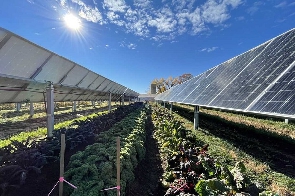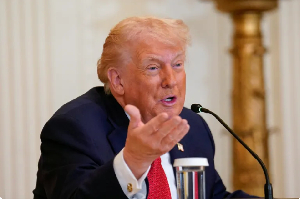Kwame Jantuah, the Chairman of the Awarding Panel of the Ghana Energy Awards (GEA), has called for the development of a solar energy policy as part of the implementation of Ghana’s Energy Transition Framework.
Speaking to journalists at a media launch of the 2023 edition of the GEA in Accra, Mr Jantuah, who is also an energy consultant, said the policy should require all new households to install solar panels to drive the renewable energy agenda.
“Those houses that are already in existence, we should find a way of also getting them onto the solar situation.
“In that case, we will transfer a bulk of our energy consumption from residential into commercial and then it opens up a situation where we can also increase our export of electricity,” Mr Jantuah told journalists.
This year’s edition of the annual GEA was launched by Mr Andrew Egyapa Mercer, a Deputy Minister of Energy.
Nominations for the annual ceremony that rewards individuals and institutions that have made significant contributions to the growth of the country’s energy sector are open from now till September 29, 2023.
The competitive categories are the Energy Personality of the Year (Male and Female), Chief Executive of the Year (Power and Petroleum), Visionary Leadership Award, and the Eco-Innovation Business Award.
Others are the Outstanding Energy Management Award, Sustainable Energy Partnership of the Year, Energy Institution of the Year, Energy Company of the Year, Brand of the Year, Rising Star Award, and Energy Reporter of the Year, among others.
The 7th GEA is on the theme: “Ghana’s Energy Transition Framework: Sector Institutions as Building Blocks For The 2030-2040 targets”.
Mr Egyapa Mercer said the energy transition had come to stay, adding that Ghana like the rest of Africa could not pretend about the effect of the climate crisis.
Mr Mercer pledged the support of the Ministry to collaborate with industry players to ensure that the country achieved its energy transition goals.
Mr Henry Teinor, the Event Director of the GEA, urged all players in the energy sector to participate in the event.
The Ministry of Energy has developed a National Energy Transition Framework (2022-2070) to decarbonise the energy sector to help achieve net zero targets as part of commitments under the Paris Agreement.
The target is to phase out fossil fuels by 2070 and fully embrace green energy sources.
The Framework balances existing efforts with new initiatives, to increase renewable energy penetration, convert thermal plants to natural gas, and integrate nuclear power into the energy mix.
Business News of Thursday, 29 June 2023
Source: GNA













